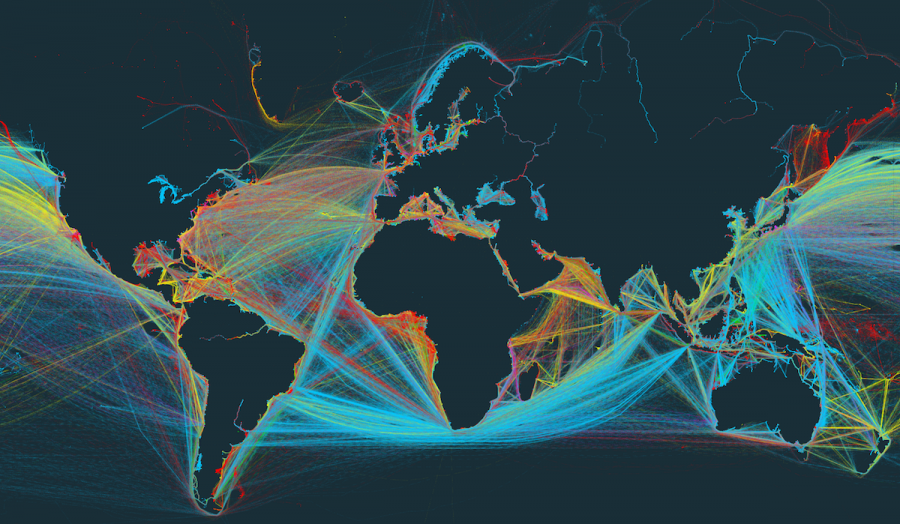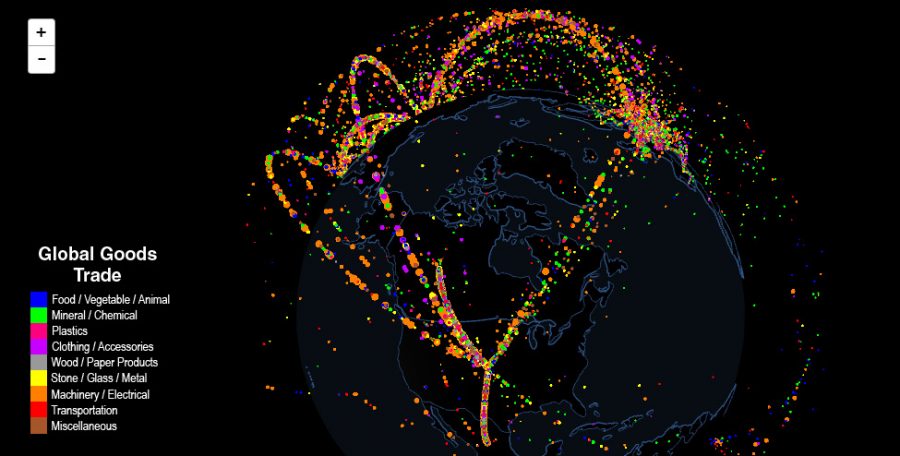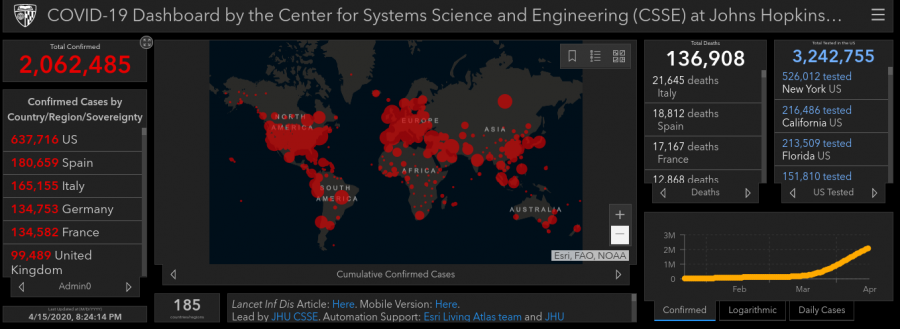Your donation will support the student journalists of Lake Forest High School. Your contribution will allow us to purchase equipment and cover our annual website hosting costs.
Coronavirus: A Lesson for Civilization
April 17, 2020
The following is a column submitted by junior Grant Huebner, who is a sprinter on the varsity track team, and is involved in numerous clubs, including Model United Nations. Want to share an opinion of your own? Send an op-ed to [email protected].

It is clear that we are living in an unprecedented time in modern history.
The progress of modern civilization, although nonlinear, has brought to the masses commodities that would have seemed unimaginable luxuries merely a century ago: our daily lives, although we usually give it little thought, are powered by an endlessly interconnected network of internet cables criss-crossing the planet, delivering the cumulative knowledge of mankind in the fraction of a second; when we are hungry, we take produce from our refrigerators, often grown thousands of miles away and sold in supermarkets filled to the brim with an incredible variety of foodstuffs and household necessities; at any given time, hundreds of thousands of people are racing across the sky in metal tubes to far-away lands with diverse languages and cultures.
This coming-together of the world is the millennia-long expansion of humanity’s worldview made manifest; from the beginning of recorded history, our outlook on the “world” has progressed from first one’s immediate surroundings, usually the few miles surrounding one’s agrarian village (which most would never leave), to one’s immediate region (say, Chicagoland), to one’s country, and, with the progress of the past century, the entire planet (and, for those lucky few, beyond).
Everything we see is a triumph of globalization: we drive German Volkswagens while taking pictures of the Italian carbonara we’re eating on phones designed in California and made in China. Most of us speak languages that come from far away countries, and often we visit those countries ourselves. Our quality of life is the highest it has ever been, and now is the most peaceful time in human history.
The Double-Edged Sword
But this is all a double-edged sword; the glories that have come from our intricate global society have put us in a situation where the actions of individuals continents away have very real, and possibly potent, impacts upon our lives. A drone strike on a Saudi Arabian oil production facility could raise global oil prices by 19.5%, affecting average consumers in the US; a civil war in Syria could start a decade-long refugee crisis in the European Union, leading to the Brexit of the United Kingdom so they could “take back control” of their borders; and, most pressingly today, a person in a wet market in Wuhan, China, could be infected with a virus, beginning the exponential spread of COVID-19, which, at the time of this article, has infected some 2,000,000 and killed almost 130 thousand, leading to entire countries shutting down indefinitely and trillions being wiped off the stock market.
It is in this setting of unprecedented fear where a controversial view on what can be seen as one of the greatest pandemics since the Spanish Flu (1918-2020) may be offered: Coronavirus is a triumph for civilization.
Above all, the leaders of the world were not prepared for a pandemic of any kind. Despite wargames and hypothetical pandemic briefings, many of the governments of the world did not act with the measure and precision necessary to combat the global blitzkrieg of COVID-19. Even today, the Trump administration offers conflicting messages on how to deal with the virus: the president has previously pushed to have the country “opened up by Easter,” and yet has also extended social distancing guidelines to April 30th. We knew that Coronavirus was coming months ago, but we did nothing.
It is because of this indecision and lack of leadership — not just in the United States, but in the world over — that Coronavirus has been allowed to spread so fast and disrupt so much. It is because of this indecision and lack of leadership that the world is certainly in a recession (how bad it will be and for how long is unknown); it is because of this lack of action that more than seventeen million Americans have filed for unemployment over the past four weeks as stores are forced to shut down; it is because of this lack of global reactionary and premeditated response that hundreds millions of people, without unprecidented action, are predicted to get COVID-19 by the year’s end.
What If?
But it could have been so much worse.
According to the World Health Organization, COVID-19 has a rough fatality rate of 3.4%. This is very low as compared to that of other disease outbreaks: the Ebola Virus Disease has an average case fatality rate of 50% (varied from 25% to 90% in past outbreaks), and the SARS 2002-2003 outbreak had a mortality rate of 10%. For comparison, the seasonal flu has a mortality rate of .1%.
To see the severity of a pandemic of such fatality rates on the global population for the current confirmed case load of COVID-19 — for our arithmetical purposes set at 2,000,000 cases — with the fatality rates of the above diseases, the total death toll would be 1,000,000 with the fatality rate of Ebola, and 200,000 with the fatality rate of SARS.
Of course, the COVID-19 pandemic is still ongoing, and the vast majority of cases are open, but the severity of hypothetical very fatal pandemic comes into clear picture. Coronavirus is predicted to infect hundreds of millions of people by this year’s end without unprecedented measures of imposed isolation: a disease as contagious as Coronavirus and as deadly as, say, Ebola or SARS, could hypothetically kill millions of people.
The effects of such a pandemic on the world cannot be understated: not only would the entire planet come to a halt, as is the case with COVID-19, but it would fall apart as millions of people panic in the face of other millions dying: the entire global economy would crash, the rule of law would collapse: our entire civilization would fall apart not in the face of a hot nuclear war as many predicted (especially during the Cold War), but in the painful death of the advance of disease.
This perhaps seems crazy: “such a pandemic could never happen,” one could say, “nothing like the Black Plague could happen now with our medicine and technology.”
This belief is not only terribly false, but is very, very dangerous. This very way of thinking is what led to the government inaction which led to the severity of this pandemic in the first place: up until now, the world and its leaders believed that pandemics like those of the past, although could happen, likely wouldn’t happen, while at the same time setting the world up for a catastrophic awakening through the increasing interconnectedness of globalization.
Coronavirus has destroyed this delusion.
A Lesson For Civilization
The world has had a pandemic a long time coming. And we were, and still are not, prepared for one. Someday, a very contagious and deadly disease will appear, and will begin to spread at incredible rates. But it is in this very moment, where billions of people are quarantined in some manner or another, where humanity decides how bad this pandemic will be.
Before now, the progress of civilization has seemed almost unstoppable, and in this unprecedented time of commodities that would have seemed to be unimaginable luxuries merely a century ago we failed to appreciate the incredible nature of our interconnected planet. We believed that we were invincible, and for those who suffered from disasters, well, they simply weren’t. But this age of naïveté has been destroyed by this pandemic, and invincibility has been replaced by rising numbers of unemployment, disease cases, and deaths.
This, right now, as you are reading this, lies a lesson for civilization. We have been forced to realize that we are not invincible, that these disasters — previously reserved for the “other” — can and will happen to us; and therefore we must plan accordingly. We can no longer ignore science and history: we must learn and remember it so we may prevent the past from so eerily happening again — because a highly contagious and deadly pandemic will happen, someday: and we must be prepared for it.
In Conclusion
Our world has been irreversibly changed. It is unknown how this pandemic will end; perhaps this marks the beginning of the Age of Social Distancing, or the beginning of some sort of reversal of globalization. But one thing is certain: for the future progress and prosperity of our civilization, we needed some disaster large enough to shake our world, but not large enough to destroy it. This disaster is Coronavirus. It is undeniable that we were not prepared for a pandemic: imagine that instead of COVID-19 our world was being assaulted by a highly contagious Ebola or SARS.
This global unpreparedness will result in the deaths of perhaps hundreds of thousands, and is an incredible tragedy which should never be forgotten; our leaders must be held accountable for their actions and the lack-of-thereof. It has forced us and our leaders to prepare for the impossible, and has destroyed our false sense of invincibility.
This is a lesson for civilization.
For if it wasn’t Coronavirus that taught us this lesson, then it would have been some major pandemic in the future of who knows what proportion; our history is a history of pandemics of incredible proportion.
The next great pandemic is coming, whether we like it or not. Now is when we decide how bad it will be.



Colin Kingsley • Apr 17, 2020 at 10:02 am
Nice article Grant! Good points about globalization and relative fatality rates.
Anonymous • Apr 17, 2020 at 9:45 am
Fascinating article.